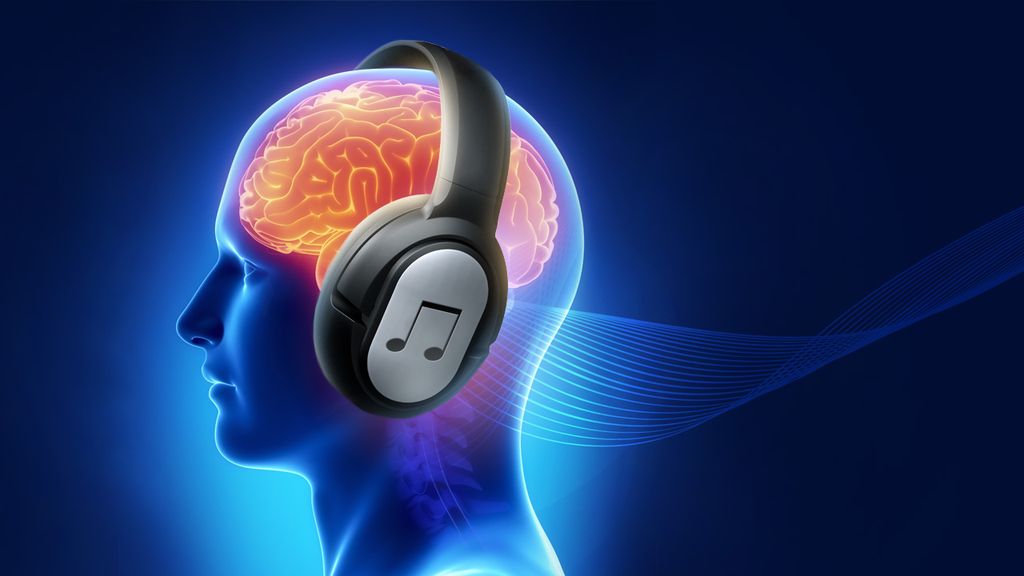By Amy Casarella
Is Music Affecting Our Memory?
 Music has been scientifically proven as beneficial, having effects such as reducing stress, enhancing blood vessel function, improving sleep quality, and improving cognitive performance. However, one thing that music does not improve is one’s ability to focus. In a recent study conducted at Georgia Institute of Technology, researchers found that listening to music decreased the efficiency of remembering names.
Music has been scientifically proven as beneficial, having effects such as reducing stress, enhancing blood vessel function, improving sleep quality, and improving cognitive performance. However, one thing that music does not improve is one’s ability to focus. In a recent study conducted at Georgia Institute of Technology, researchers found that listening to music decreased the efficiency of remembering names.
Participants in this study were asked to match faces to names, a task that involves associative memory. In associative memory, a memory of an event or place is triggered by the recollection of something associated with it. Music is heavily involved in associative memory, which is why it can be upsetting to listen to certain songs if you have associated them with an ex-significant other. Much like other types of memory, associative memories are processed in the hippocampus of the brain.
Some participants completed this name-face test in silence, while others had non-lyrical music playing in the background. All age groups of participants agreed that the music was distracting from the test, but only the scores of the older adults were affected by it.
Is iPhone Separation Anxiety Real?
 Have you ever searched for a ringing phone, feeling your anxiety increase with each ring? Or experienced a mini heart attack when you thought you lost your phone only to discover it was in a different pocket? Most older generations would criticize you for being so obsessed with technology, but recent studies have shown that ‘iPhone separation anxiety’ is a real disorder – and it is plaguing the younger generations of today’s society.
Have you ever searched for a ringing phone, feeling your anxiety increase with each ring? Or experienced a mini heart attack when you thought you lost your phone only to discover it was in a different pocket? Most older generations would criticize you for being so obsessed with technology, but recent studies have shown that ‘iPhone separation anxiety’ is a real disorder – and it is plaguing the younger generations of today’s society.
The average person spends about two hours and fifty-seven minutes on a smartphone or tablet every day. Most of us get stressed out if we misplace our phone, are constantly checking for notifications, and even feel ‘phantom vibrations’ – a sensation that we have received a notification when we really have not. Most people would dismiss this anxiety as an unhealthy obsession with technology, but research has shown that these feelings are legitimate and smartphone separation can have serious psychological and physiological effects.
New Huntington’s disease clinical trial to enter Phase 1 in 2015
Huntington’s disease (HD) is a neurodegenerative disorder that slowly diminishes one’s ability to walk, talk, and reason until eventually control is completely lost. HD is an autosomal dominant genetic disorder, so everyone who carries the gene is guaranteed to develop the disease and will have a 50% chance of passing it on. Currently, there is no cure for this devastating disease, and most die within 10-20 years after onset.
With no treatment or way to stop the progression of HD, the outlook of those diagnosed has seemed pretty bleak. Until now. A new clinical trial for an HD drug is set to enter Phase 1 in 2015. This drug is meant to target the source of HD itself: the Huntington gene.
Keep Calm And Neuroscience On
It’s every student’s favorite time of the semester: midterm week. As you are freaking out about the upcoming exams that you have, you notice that others around you are relatively calm. You envy them and their ability to cope with stress. But here’s the thing: keeping calm under pressure isn’t a character trait or ability, it’s a skill that you can teach yourself in minutes. You’re probably thinking that that sounds ridiculous, but by following a few simple steps one can easily improve one’s ability to manage stress.
New Blood Test Can Predict Alzheimer’s Disease
For years doctors have been able to detect the early symptoms of Alzheimer's disease through scans, lumbar punctures, and genetic testing. While these methods can be painful or expensive, a new blood test has recently been discovered that can easily and accurately predict the onset of Alzheimer’s disease.
Doctor Howard J. Federoff of Georgetown University Medical Center conducted a research study in which he took blood samples from hundreds of healthy, elderly men and women over the age of 70. Over the next five years, some of these healthy individuals developed Mild Cognitive Impairment or Alzheimer’s Disease. Federoff then compared their blood samples to the samples of the healthy individuals. He found a group of ten lipids, or fats, that were present in lower amounts in the blood samples of the participants who had developed Alzheimer’s Disease.
Neuroplasticity of Music
As we grow and discover new artists, we refine the compilation of music in our brains. But do we stop developing taste in music at a certain age? Many researchers believe that by the age of 14 musical preferences are completely developed. Does this mean that your taste in music is set in stone for the rest of your life? Not exactly.
In an article from the New York Times, David Hajdu points out that major music stars such as John Lennon, Paul Simon, and Aretha Franklin, and many other successful artists all turned 14 during the mid-50s, when rock ‘n’ roll was first becoming a major genre. Altough it may just be a strange coincidence, Hajdu believes that this is what influenced them to pursue music as a career “Fourteen is a sort of magic age for the development of musical tastes,” says Daniel J. Levitin, a professor of psychology and the director of the Laboratory for Music Perception, Cognition and Expertise at McGill University. “Pubertal growth hormones make everything we’re experiencing, including music, seem very important. We’re just reaching a point in our cognitive development when we’re developing our own tastes. And musical tastes become a badge of identity.”
The Effects of Stress on Memory Loss
 Stressed out? You may be at a higher risk for Alzheimer's disease. You're probably wondering to yourself how that is possible. Highly intelligent people who use their brains all of the time, like scientists, CEOs, and presidents, deal with stress on a day to day basis. The truth is that lack of higher education or brain activity is not the only major cause of dementia.
Stressed out? You may be at a higher risk for Alzheimer's disease. You're probably wondering to yourself how that is possible. Highly intelligent people who use their brains all of the time, like scientists, CEOs, and presidents, deal with stress on a day to day basis. The truth is that lack of higher education or brain activity is not the only major cause of dementia.
If keeping your brain active is a good way to prevent cognitive decline, then why did people such as Ronald Reagan and Norman Rockwell develop Alzheimer’s disease? The answer is stress. Recent studies have shown that people who deal with high levels of stress in their career or their family life are more likely to develop dementia. Stress cannot be said to directly cause dementia, but it is a trigger for the degenerative process in the brain.
An Argentine research team examined 118 patients with Alzheimer’s disease and 81 healthy individuals whose age, gender, and educational level were comparable to the Alzheimer's patients. Both groups were questioned about the amount of stress that they had faced in the past three years. The researchers reported that 72% of the Alzheimer’s patients admitted to coping with severe emotional stress or grief, such as the death of a loved one or financial problems. This was nearly three times as many as the control group.

